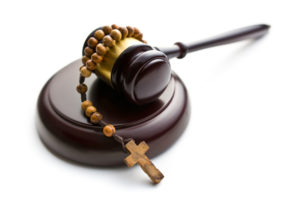Rules Are for Schmucks: Religious Liberty vs. the Rule of Law

Frederick Clarkson at Rewire News reports that sometime in the near future, with great fanfare, a new “American Charter of Freedom of Religion and Conscience” will have its grand unveiling. The coalition behind the charter promises to set a middle-of-the-road standard for contentious issues that America can unite around. Prominent figures, including perhaps a former president or two, are expected to unite in support. Its sponsors boast that it was “drafted in collaboration with scholars, experts, and key representatives of diverse religious and nonreligious constituencies from across the political and ideological spectrum,” and that its purpose is “to revive our nation’s vision of a civil public square to counter the incivility of the last half century of culture-warring.”
Unfortunately, as Clarkson correctly points out, there is no compromise here. The charter is a one-sided screed that can be summarized as “God experts get to do whatever they want, whenever they want.”
Much of the charter is devoted to pompous rhetoric. The freedom to ignore laws “is rooted in the inviolable dignity of each human being,” representing a “birthright of belonging.” “Conscience-bound by what we each believe to be true and right concerning ultimate truth, we are not free to act in whatever manner others—including the state—may dictate. Just as all must be free to follow the dictates of conscience, all are bound by the duty to respect the right of conscience for others.”
In its very first article, the Charter demands that all the states that have declined to enact RFRA laws be stuck with RFRA anyway. This is accomplished through the recitation of the RFRA mantra that “any substantial burden on the freedom of religion must be justified by a compelling governmental interest and that the means chosen for serving that interest must be the least restrictive of freedom of religion.”
What the American Charter of Freedom of Religion and Conscience doesn’t emphasize is an even more fundamental concept: the “rule of law.” If you’ve ever played one of the Civilization computer games, you may recall that the very first advance your tribe needs to achieve, before it can do anything else, is to adopt the rule of law. Without the rule of law, as Thomas Hobbes memorably put it, life would be “nasty, brutish, and short.” With it, according to the Canadian Supreme Court, comes “a sense of orderliness, of subjection to known legal rules.”
The central importance of uniformity in the rule of law has been acknowledged for a long time. Aristotle wrote that “The rule of the law, it is argued, is preferable to that of any individual.” He did not add “unless that individual says God tells him otherwise.” British jurist A. V. Dicey defined the rule of law as having three elements:
- first, that no one should be punished by the state except for a distinct breach of law established by ordinary court proceedings;
- second, that the law should apply to all persons equally, regardless of any person’s rank or condition; and
- finally, that legal rules must be enforced by the courts [emphasis added].
The “freedom of religion” advocated by the charter rips all this to shreds. Its vision is not of John Locke’s “standing rule to live by, common to every one of that society,” but of a patchwork of exemptions created by each individual based on what he or she thinks is right. The drafters emphatically do not believe that “the law should apply to all persons equally, regardless of any person’s rank or condition,” but that the law should apply only to the extent it fits with what a person thinks God wants.
There is a compromise position available between an inflexible rule of law that never allows room for conscientious objection and the “anything goes” stance taken by the charter. Legislators can, and do, recognize narrow situations where it benefits all of us to allow exemptions for a few of us. The military draft is an example. There are some people who are just not going to participate in combat, and we’re better off putting them in non-combatant duty than we would be putting them in jail. Hands-on participation in abortion or assisted suicide is another. There are excellent medical professionals who will simply not do these things, and we are arguably better off allowing them to continue in their professions than we would be kicking them out. Reasonable people can disagree about whether these or other exemptions are justified, and when they do exist bright lines need to be drawn. But that’s what we taxpayers pay legislators to do. We have not, until the advent of RFRA, taken the charter’s position that individuals must “be free to exercise their convictions of conscience in every arena of life.”
The charter flatly rejects this compromise approach, insisting instead that “freedom of religion and conscience is foundational—it is not a gift or favor of the state and its officials.” Freedom of religion, it says, “is an inalienable right that does not increase with governmental or societal approval, or decrease with disapproval, of the beliefs and ideas in question.” In other words, governmental or societal disapproval of polygamy, hallucinogenic drug use, racial and gender discrimination, genital mutilation, animal torture, or ignoring simple health and safety rules doesn’t matter as long as your conscience (or your deity) says it’s OK.
If this is their plan “to counter the incivility,” I’d hate to see what they think “uncivil” looks like.
